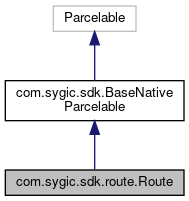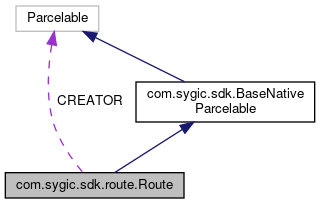

Classes | |
| interface | RoadElementsCallback |
Public Member Functions | |
| int | getRouteId () |
| GeoBoundingBox | getBoundingBox () |
| RouteInfo | getRouteInfo () |
| Waypoint | getStart () |
| Waypoint | getDestination () |
| List< Waypoint > | getWaypoints () |
| RoutingOptions | getRoutingOptions () |
| List< RouteManeuver > | getManeuvers () |
| void | getRoadElements (@NonNull RoadElementsCallback callback) |
| void | getRoadElements (@NonNull RoadElementsCallback callback, @Nullable Executor executor) |
| RouteViolatedAvoidOptions | getRouteViolatedAvoidOptions () |
| String | serializeToBriefJSON () |
| String | serializeToFullJSON () |
| List< String > | getTransitCountries () |
| boolean | equals (Object o) |
| int | hashCode () |
| int | describeContents () |
| void | writeToParcel (final Parcel dest, final int flags) |
 Public Member Functions inherited from com.sygic.sdk.BaseNativeParcelable Public Member Functions inherited from com.sygic.sdk.BaseNativeParcelable | |
| boolean | isValidParcelable () |
Static Public Member Functions | |
| static Route | deserializeFromFullJSON (@NonNull final String json) |
Static Public Attributes | |
| static final Parcelable.Creator< Route > | CREATOR |
Protected Member Functions | |
| void | finalize () throws Throwable |
| Route (final Parcel in) | |
Additional Inherited Members | |
 Protected Attributes inherited from com.sygic.sdk.BaseNativeParcelable Protected Attributes inherited from com.sygic.sdk.BaseNativeParcelable | |
| boolean | mIsValidParcelable = true |
Collection of maneuvers and roadElements connecting two or more waypoints. Waypoints may be thought of as the input to a route calculation whereas maneuvers are the results of calculating a route.
|
protected |
| int com.sygic.sdk.route.Route.describeContents | ( | ) |
For documentation, see android.os.Parcelable.describeContents()
|
static |
Deserialize route from json generated with Route#serializeToFullJSON(). Will return null if deserialization fails.
| boolean com.sygic.sdk.route.Route.equals | ( | Object | o | ) |
|
protected |
| GeoBoundingBox com.sygic.sdk.route.Route.getBoundingBox | ( | ) |
The smallest GeoBoundingBox that contains the entire route.
| Waypoint com.sygic.sdk.route.Route.getDestination | ( | ) |
Returns the destination waypoint of the route
| List<RouteManeuver> com.sygic.sdk.route.Route.getManeuvers | ( | ) |
Returns an array of directions for current route object from start. Note: This array doesn't change while navigating.
| void com.sygic.sdk.route.Route.getRoadElements | ( | @NonNull RoadElementsCallback | callback | ) |
Returns a list of RoadElement objects for current route object from start. The elements are generated asynchronously and returned via callback. The callback will be called on main thread. Note: This array doesn't change while navigating.
| void com.sygic.sdk.route.Route.getRoadElements | ( | @NonNull RoadElementsCallback | callback, |
| @Nullable Executor | executor | ||
| ) |
Returns a list of RoadElement objects for current route object from start. The elements are generated asynchronously and returned via callback. The callback will be called on provided executor or on main thread if null. Note: This array doesn't change while navigating.
| int com.sygic.sdk.route.Route.getRouteId | ( | ) |
Returns the unique id identifies the route. It is used for setting current route for navigation.
| RouteInfo com.sygic.sdk.route.Route.getRouteInfo | ( | ) |
Returns basic route info.
| RouteViolatedAvoidOptions com.sygic.sdk.route.Route.getRouteViolatedAvoidOptions | ( | ) |
| RoutingOptions com.sygic.sdk.route.Route.getRoutingOptions | ( | ) |
Returns options used for computing this route.
| Waypoint com.sygic.sdk.route.Route.getStart | ( | ) |
Returns the starting waypoint of the route
| List<String> com.sygic.sdk.route.Route.getTransitCountries | ( | ) |
Returns list of countries route is passing by
| List<Waypoint> com.sygic.sdk.route.Route.getWaypoints | ( | ) |
List of Waypoints on the route including starting point and destination.
| int com.sygic.sdk.route.Route.hashCode | ( | ) |
| String com.sygic.sdk.route.Route.serializeToBriefJSON | ( | ) |
Serialize the route to a JSON string. Brief serialization is to be used with Router#computeRouteFromJSONString(String, Router.RouteComputeListener). Only waypoints and routing options are saved, so route has to be computed again.
| String com.sygic.sdk.route.Route.serializeToFullJSON | ( | ) |
Serialize the route to a JSON string. Full serialization is to be used with Route#deserializeFromFullJSON(String). All of route info is saved, so no computing is needed.
| void com.sygic.sdk.route.Route.writeToParcel | ( | final Parcel | dest, |
| final int | flags | ||
| ) |
For documentation, see android.os.Parcelable.writeToParcel().
|
static |